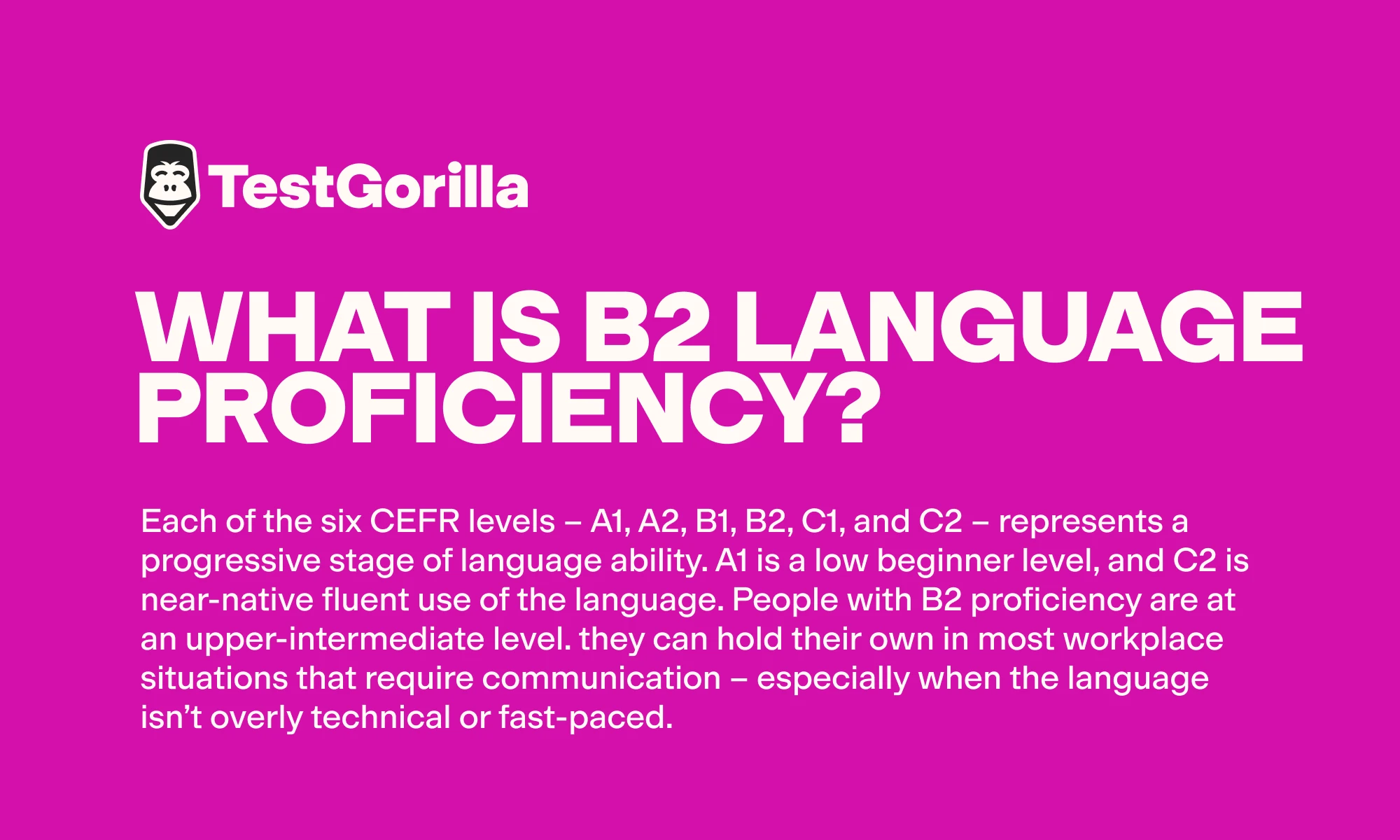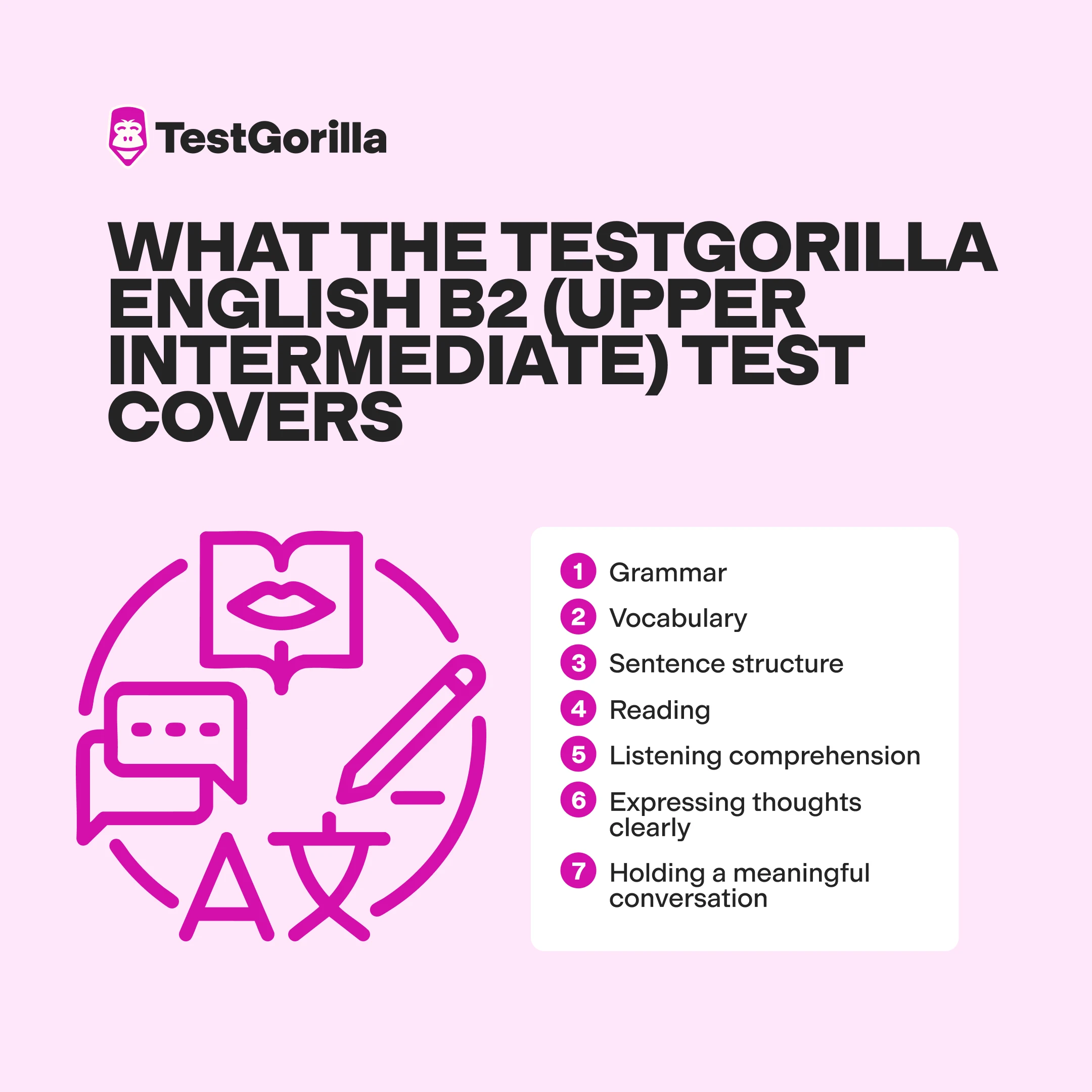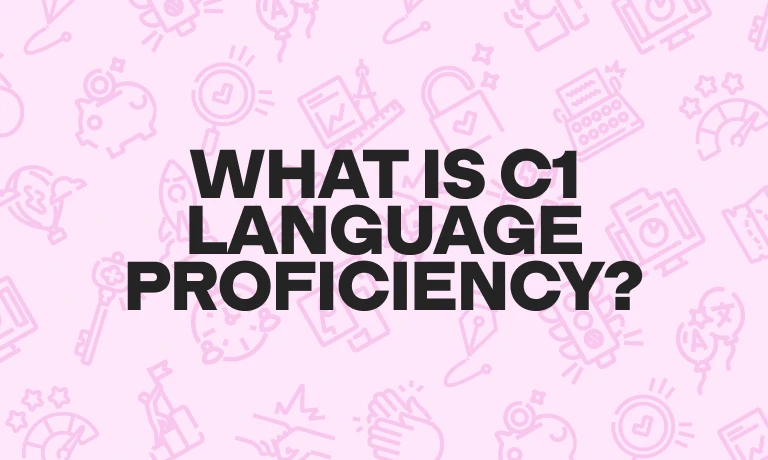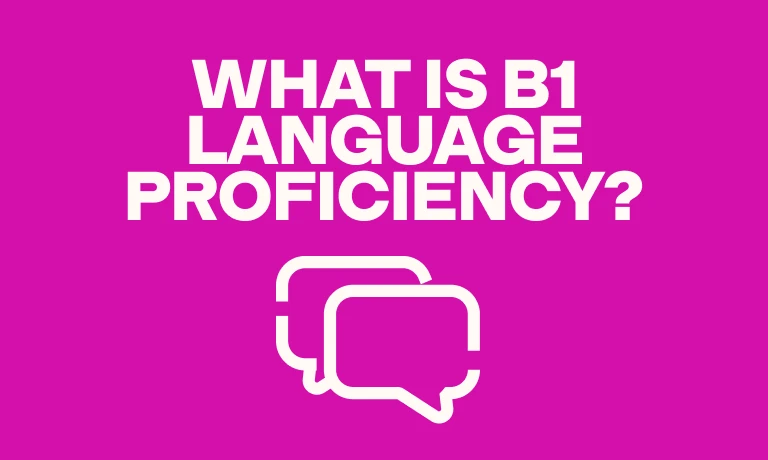Hiring someone who can “speak English” is one thing – hiring someone who can actually communicate with your team and customers is another.
Resumes often list B2 proficiency, but what does it mean for your business? How can you be sure applicants have the language fluency necessary for success in their role?
Below, we break down what B2 language level looks like, why it matters for business communication, how to test it during hiring, and where tools like TestGorilla’s B2 language test can help.
Understanding B2 language proficiency
When a candidate lists “B2 proficiency” on their resume, it means they’ve reached an upper-intermediate level of language skills, based on the Common European Framework of Reference for Languages (CEFR).
At this level, they can hold their own in most workplace situations that require communication – especially when the language isn’t overly technical or fast-paced.
B2 speakers can handle abstract topics and discussions about a range of subjects, not just small talk or routine tasks. They can understand the main points of meetings, read and respond to emails, and explain ideas clearly. They might pause occasionally, searching for expressions, but they don’t rely on translation tools for everyday conversations.
For example, a B2-level English speaker could comfortably lead a client onboarding call, contribute to a cross-functional team meeting, or write a follow-up email summarizing key points – all without needing much support.
They can ask follow-up questions if something isn’t clear and manage back-and-forth emails with a vendor or speak with a client to explain an issue and offer alternatives – without the message getting lost in translation.
Beyond just knowing basic phrases, they can also understand tone, nuance, and implicit meaning, which helps them avoid awkward miscommunications. For instance, a B2-level support agent can adjust their response to a customer who sounds annoyed or confused.
The role of B2 language proficiency in business communication
In multinational teams, B2 proficiency makes a big difference. A 2024 study of multinational companies in Myanmar found that local managers with at least B2-level English were far better at working with their international counterparts.
They could keep up in meetings, follow complex discussions, and help information flow across the organization. In short, fewer mix-ups and better teamwork.
At Ogilvy & Mather’s Beijing office, English skills were part of the day-to-day reality of working with international clients. To help with that, the company rolled out a training course focused on financial English, and it quickly caught on with staff.
According to their finance manager, Shen Xiaoping, stronger language skills didn’t just help people do their jobs better – it made them more confident and opened doors for career growth. It also made direct exchange with global partners easier.
That kind of impact isn’t perfect fluency, but it’s enough to work, collaborate, and connect in complex situations – without language getting in the way.
The best insights on HR and recruitment, delivered to your inbox.
Biweekly updates. No spam. Unsubscribe any time.
Assessing B2 language proficiency in candidates
So, you’ve got a role that calls for strong English communication skills – but how do you know if a candidate’s language proficiency is up to the task?
B2 proficiency can sound a little abstract on a resume, but the good news is that there are reliable ways to assess it without guessing. The key is combining standardized tools with real-world scenarios that reflect how your team communicates.
One common approach is to use standardized language tests – CEFR-aligned assessments that evaluate grammar, vocabulary, reading, and listening.
These tests help you gauge whether a candidate meets the general criteria for B2:
Can they understand the main ideas in meetings?
Can they follow an email thread without getting lost?
Can they express themselves clearly on more than just day-to-day topics?
But just as important are practical assessments – like asking candidates to respond to a customer query, summarize a short report, or join a short role-play conversation during the interview.
Daniel Morgan, head of learning development at the Shenker Institutes of English, puts it this way: “Fluency actually refers to how smoothly and efficiently a second-language speaker can speak on a range of topics in real time.”
That’s where TestGorilla’s language proficiency tests come in handy. The English B2 (Upper Intermediate) test, for example, covers the core areas you need to assess: grammar, vocabulary, sentence structure, reading and listening comprehension, and the ability to express thoughts clearly and hold a meaningful conversation.
However, an effective English test is not just about ticking boxes – it’s about seeing whether someone can use the language in ways that matter at work.
For example, candidates might be asked to complete sentences like:
If I ______ you were coming to town, I would have thrown a party with all our friends.
___________ that she isn’t the best candidate for the job, she is considering withdrawing her application.
These kinds of questions show how comfortable someone is with more complex sentence construction, shades of meaning, and contextual thinking – exactly what’s needed in professional communication.
The test is built around the CEFR B2 level. It helps identify candidates who can understand complex texts, follow technical discussions in their field, and engage comfortably with a native speaker.
It’s ideal for roles like administrative assistants, receptionists, and data entry clerks – jobs that require solid, day-to-day communication skills for professional purposes but not full mastery of the language.
Integrating B2 language assessments into the hiring process
Just like you wouldn’t skip checking someone’s technical know-how or experience, assessing B2 language proficiency early in the hiring process helps avoid surprises later.
The most effective way is to build the assessment into your screening stage. After the initial application, invite candidates to complete a short B2 language test.
Testing for English fluency or accuracy doesn’t have to be complicated – just enough to see whether they can understand everyday work communication, respond clearly, and follow along with written or spoken instructions. This gives you a quick but reliable signal about whether their language skills match the role.
Doing this early saves time for everyone. You avoid interviewing candidates who may look great on paper but struggle with real-world communication. Plus, candidates get a fair shot at showing their skills in a structured, job-relevant way, which is especially helpful for those whose resumes might not fully reflect their language ability.
If you need candidates with stronger fluency, TestGorilla also offers an English C1 Advanced test so you can match the right level of proficiency to the role's demands. There are also B2 language tests in German, Spanish, Korean, and French to assess proficiency in other languages.
Identify the ideal candidate for your team
Making the mistake of hiring someone who looks great on paper but can’t keep up in a conversation leads to miscommunication, which is not just frustrating but can hurt your team and your business.
When you assess for B2 proficiency early in the hiring process, you catch those gaps before they turn into problems and find people who can actually do the job, communicate clearly, and handle regular interaction and familiar matters, as well as unexpected issues.
TestGorilla’s B2 language level tests make it simple to screen for the skills that matter and help prevent the high costs of mis-hiring and lost productivity.
Looking for more ways to hire with confidence? Check out our full library of language tests and sign up for a free TestGorilla account today.
You've scrolled this far
Why not try TestGorilla for free, and see what happens when you put skills first.
















